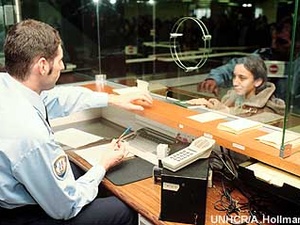UNHCR makes proposals to enhance security of asylum systems
UNHCR makes proposals to enhance security of asylum systems
GENEVA - The UN refugee agency, UNHCR, announced Thursday a set of specific proposals to governments reviewing asylum systems from a security point of view after the September 11 attacks in the United States.
UNHCR said it recognized that "appropriate mechanisms need to be put in place in the field of asylum as in other areas." At the same time, the agency said it is concerned that, in the process of adopting new measures to combat terrorism, governments should make extra efforts to take into account the safeguards that are already built into the 1951 Refugee Convention and other areas of international refugee law.
"The international refugee instruments do not provide a safe haven to terrorists and do not protect them from criminal prosecution," UNHCR said. "On the contrary, they render the identification of persons engaged in terrorist activities possible and necessary, foresee their exclusion from refugee status and do not shield them against either criminal prosecution or expulsion."
In the course of having an asylum claim processed, an asylum-seeker already undergoes much more stringent scrutiny into his or her background than most other international travellers - such as businessmen, tourists or students.
The 1951 Refugee Convention already contains so-called "exclusion clauses", which deny asylum to people who have committed particularly serious crimes. UNHCR has stressed that the Convention also allows states, as a last resort, to expel individuals who have claimed asylum - or have already been recognized as refugees - if they present a genuine threat to national security.
UNHCR is particularly concerned that legislation currently being proposed be framed so as not to have negative repercussions on innocent refugees. This could, for instance, occur if new measures were to deny them access to asylum systems altogether, or if there were insufficient safeguards to ensure that asylum-seekers are not expelled before their asylum claims have been properly examined.
UNHCR's view is that it is much better for all concerned - including refugees and law enforcement agencies - to deal with all asylum claims within the clearly defined international legal framework that already exists, while at the same time tightening any loopholes in national asylum practices that could conceivably be exploited by a terrorist.
UNHCR has circulated a number of concrete suggestions to governments which it believes could help them identify and deal with any terrorist who might attempt to enter a country via the asylum system. Suggestions include:
- Enhanced cooperation between border guards, intelligence services and immigration and asylum authorities, as well as with organizations such as Interpol, Europol and Eurodac. If extra security checks, such as fingerprinting, are adopted, care should be taken to ensure they do not slow down what is already in some cases a cumbersome procedure, and do not discriminate on the basis of national, religious or racial characteristics.
- Rigorous use of the exclusion clauses in the 1951 Convention. UNHCR is also encouraging States that have not already done so to incorporate the exclusion clauses into their national legislation.
- Establishment of specialized "exclusion units" to deal rapidly with cases in which asylum-seekers are suspected of terrorism or serious crimes. The "exclusion unit," in such countries where it is needed, would have expertise in relevant areas of refugee law and criminal law, specialist knowledge of terrorist organizations and clear communication links with intelligence services and criminal enforcement agencies. UNHCR has suggested the redesign of the asylum procedure in some states to accommodate such a unit, and to provide it with sufficient resources to function efficiently.
- Use of detention, with clear legal safeguards, for any asylum-seeker suspected of being involved in acts of international terrorism, providing there are solid grounds for such suspicions.
UNHCR has also sought to clarify the circumstances under which measures such as cancellation of refugee status, expulsion and extradition are permitted under international refugee law. The agency also stressed that - given the possibly life-threatening consequences of an incorrect decision for genuine refugees fleeing persecution - such measures should not be resorted to "on the mere assumption" that an asylum-seeker or refugee may be involved in terrorism. They should also be the result of individual assessment rather than any kind of blanket group assessment.





